Daily Vocabulary Words: List of Daily Used Words in Leading International Newspapers
Hi there. Welcome to this special section @ Wordpandit.
Our endeavour here is very simple: to highlight important daily vocabulary words, which you would come across in leading newspapers in the country. We have included the following newspapers in our selection:
• The New York Times
• The Washington Post
• Scientific American
• BBC
• The Guardian
• Psychology Today
• Wall Street Journal
• The Economist
We are putting in extensive work for developing your vocabulary. All you have got to do is be regular with this section and check out this post on a daily basis. This is your repository of words that are commonly used and essentially, we are posting a list of daily used words. Hence, this has significant practical application as it teaches you words that are used commonly in leading publications mentioned above.
Visit the website daily to learn words from leading international newspapers.
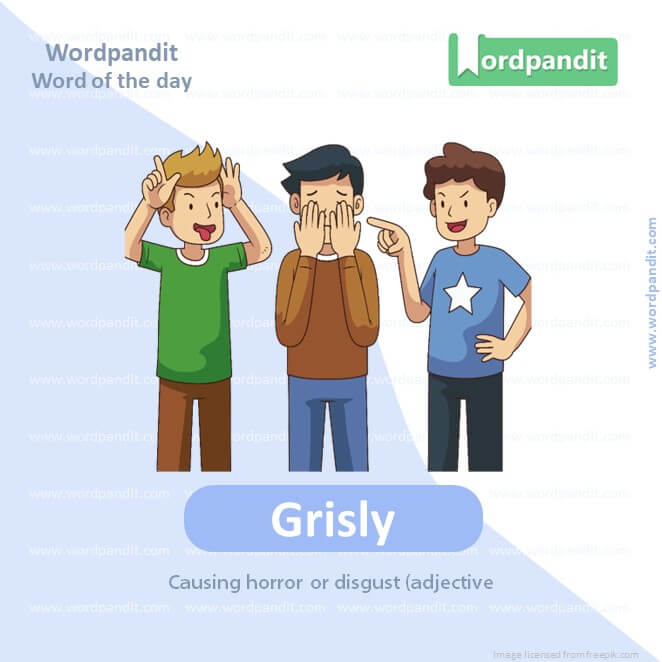
WORD-1: Grisly
CONTEXT: The scenes from the massacre, as described by witnesses and displayed in videos broadcast by news networks, were as grisly as can be imagined.
SOURCE: Al Jazeera
EXPLANATORY PARAGRAPH: Imagine seeing something that makes you go “Eww!” or “Yikes!” because it’s kind of scary or yucky. That’s what we call “grisly.”
MEANING: Causing horror or disgust (adjective).
PRONUNCIATION: “GRIZlee”
SYNONYMS: Ghastly, gruesome, macabre, horrifying, frightful, horrific, lurid.
USAGE EXAMPLES:
1. They found a grisly scene in the haunted house.
2. The movie had a grisly ending.
3. He told a grisly tale of the shipwreck.
4. The news reported the grisly details of the accident.
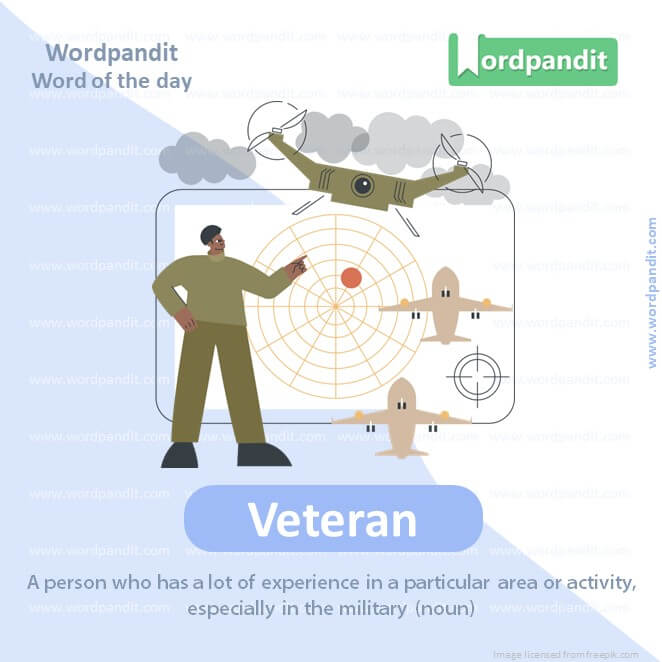
WORD-2: Veteran
CONTEXT: Israel performed this exact routine just last year, after it murdered Palestinian-American journalist and Al Jazeera veteran Shireen Abu Akleh.
SOURCE: Al Jazeera
EXPLANATORY PARAGRAPH: You know how some people have been doing something for a very long time, like a grandpa who was a soldier for many years? Those people with lots of experience are called “veterans.”
MEANING: A person who has a lot of experience in a particular area or activity, especially in the military (noun).
PRONUNCIATION: “VETeran”
SYNONYMS: Old hand, expert, pro, master, seasoned, experienced hand, old-timer.
USAGE EXAMPLES:
1. My grandfather is a veteran of World War II.
2. She’s a veteran teacher with over 30 years of experience.
3. The team had both young players and veterans.
4. As a veteran journalist, he was respected by all.
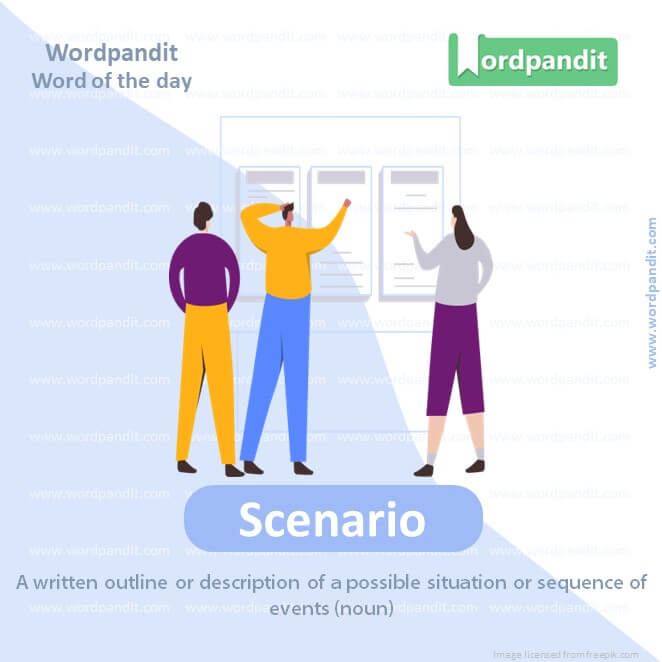
WORD-3: Scenario
CONTEXT: Over the years, the same scenario played out over and over again as Israel repeatedly committed atrocities, denied responsibility and walked back its baseless denials only when the evidence to the contrary became too compelling and the world’s attention had moved elsewhere.
SOURCE: Al Jazeera
EXPLANATORY PARAGRAPH: Think of a story or a plan in your mind, like imagining what would happen if it rained candy! That imagined situation or plan is called a “scenario.”
MEANING: A written outline or description of a possible situation or sequence of events (noun).
PRONUNCIATION: “scehNAHreeoh”
SYNONYMS: Situation, case, circumstance, setting, scene, plot, storyline.
USAGE EXAMPLES:
1. What’s the worst-case scenario if we miss the train?
2. He described a scenario where the city would run out of water.
3. The movie had an interesting scenario.
4. Let’s discuss different scenarios for our summer vacation.
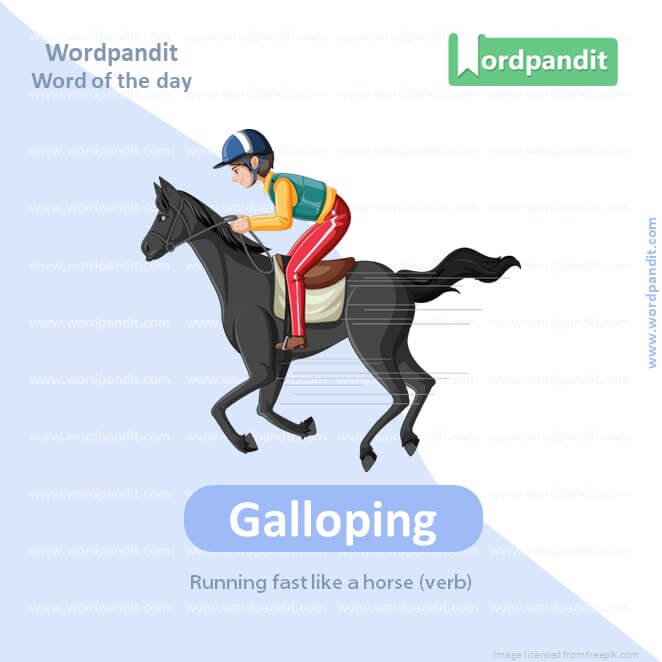
WORD-4: Galloping
CONTEXT: There is nothing new about dodgy information galloping ahead of truth, especially in times of crisis. Shakespeare opens Henry IV Part II with Rumor alone on stage, “stuffing the ears of men with false reports”.
SOURCE: The Guardian
EXPLANATORY PARAGRAPH: Imagine a horse running super fast, like it’s in a hurry. When it runs that fast, we say it’s “galloping.”
MEANING: Running fast like a horse (verb).
PRONUNCIATION: “GALuhping”
SYNONYMS: Running, sprinting, rushing, dashing, bolting, charging, racing.
USAGE EXAMPLES:
1. The children imagined they were galloping on horses in the wild.
2. I could hear the galloping hooves in the distance.
3. The deer was galloping through the meadow.
4. The heart disease was galloping, and the patient needed urgent care.
WORD-5: Presumption
CONTEXT: The presumption that it was aerial bombardment moves more nimbly through channels that are primed to expect the worst of Israel than data supplied less than 24 hours later suggesting it was an Islamic Jihad rocket misfiring.
SOURCE: The Guardian
EXPLANATORY PARAGRAPH: Imagine if someone thought they knew something without really having proof, like guessing there’s ice cream in the fridge without checking. That guess or belief without proof is called “presumption.”
MEANING: A belief or assumption made without proper evidence (noun).
PRONUNCIATION: “preSUMPshun”
SYNONYMS: Assumption, supposition, speculation, guess, surmise, conjecture, inference.
USAGE EXAMPLES:
1. It’s a presumption to think everyone will agree.
2. Her presumption of innocence was later confirmed.
3. Based on the presumption that it might rain, she brought an umbrella.
4. Making such a presumption without facts can be misleading.
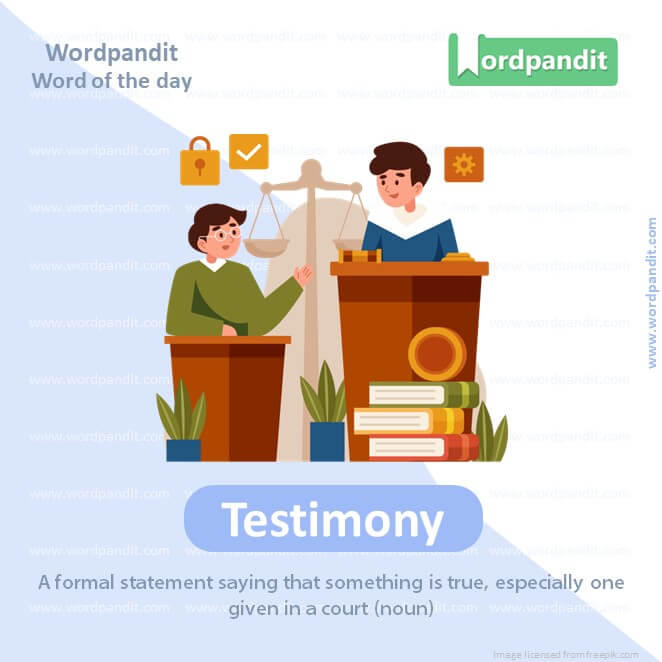
WORD-6: Testimony
CONTEXT: (I know that’s just what a conspirator would say, but if any testimony from political insiders is invalidated by proximity to the system there’s no way to prove or disprove anything, so you’ll just have to take my word for it.)
SOURCE: The Guardian
EXPLANATORY PARAGRAPH: Imagine someone telling an important story about something they saw or know, especially in a place like a court. That important story they tell is their “testimony.”
MEANING: A formal statement saying that something is true, especially one given in a court (noun).
PRONUNCIATION: “tesTImohnee”
SYNONYMS: Statement, declaration, affirmation, evidence, attestation, account, deposition.
USAGE EXAMPLES:
1. Her testimony was crucial for the trial.
2. Witnesses gave their testimonies about the accident.
3. The jury listened carefully to the testimony.
4. His testimony confirmed what the detectives suspected.
WORD-7: Repellence
CONTEXT: I know plenty of people who are deeply engaged in politics, not (yet) despairing of British democracy, determined to vote at the next election, but who are also finding contact with news media distressing to the point of physical repellence.
SOURCE: The Guardian
EXPLANATORY PARAGRAPH: Imagine a magnet pushing another magnet away. When something pushes or keeps something else away, that pushing away power is called “repellence.”
MEANING: The quality of driving or forcing back or away (noun).
PRONUNCIATION: “rePELens”
SYNONYMS: Repulsion, aversion, disgust, distaste, revulsion, abhorrence, loathing.
USAGE EXAMPLES:
1. The repellence of the two magnets was evident.
2. The repellence she felt towards the idea was clear.
3. Some insects have a natural repellence to certain plants.
4. His repellence to change was well-known.
WORD-8: Pitifully
CONTEXT: It is the spectacle of people, left and right, grasping for agency when confronted with events that demand action and moral urgency but are unfolding way beyond their control in a complex geopolitical and historical context for which their routine shtick is pitifully inadequate.
SOURCE: The Guardian
EXPLANATORY PARAGRAPH: Imagine feeling really, really sorry for a sad puppy. When something makes you feel that kind of strong sadness or pity, it’s happening “pitifully.”
MEANING: In a way that arouses pity or compassion (adverb).
PRONUNCIATION: “PITifullee”
SYNONYMS: Sadly, woefully, pathetically, miserably, sorrowfully, lamentably, deplorably.
USAGE EXAMPLES:
1. The child looked pitifully at the broken toy.
2. He was pitifully unaware of the reality.
3. The animal lay pitifully injured by the side of the road.
4. She sang pitifully, pouring her emotions into the song.
WORD-9: Gravitas
CONTEXT: That and the pretence that trivialized politics can summon instant gravitas when the moment demands it.
SOURCE: The Guardian
EXPLANATORY PARAGRAPH: Imagine someone who speaks and acts in a way that makes everyone listen and think they’re important and serious. That special seriousness and importance they have is called “gravitas.”
MEANING: Seriousness and importance of manner, leading others to respect and consider one deeply (noun).
PRONUNCIATION: “graVItas”
SYNONYMS: Dignity, seriousness, solemnity, weightiness, authority, presence, respectability.
USAGE EXAMPLES:
1. The leader spoke with gravitas about the country’s future.
2. Despite her young age, she had a gravitas that made people listen.
3. The role required an actor with gravitas.
4. He carried the gravitas of someone who had seen and learned much.
WORD-10: Idiocy
CONTEXT: Idiocy and prejudice are not innovations. The digital cacophony is also an expression of greater diversity in media.
SOURCE: The Guardian
EXPLANATORY PARAGRAPH: Imagine someone doing something really silly or not smart at all, like trying to eat soup with a fork. That silly or not smart action can be called “idiocy.”
MEANING: Extremely foolish or stupid behavior (noun).
PRONUNCIATION: “idEEosee”
SYNONYMS: Stupidity, foolishness, senselessness, absurdity, inanity, silliness, brainlessness.
USAGE EXAMPLES:
1. His idiocy got him into trouble again.
2. The decision was sheer idiocy.
3. They laughed at the idiocy of the situation.
4. I can’t believe the idiocy of forgetting my own password.
Vocabulary PDF
In the digital age, the way we learn languages has transformed dramatically. Among the myriad of resources at our disposal, a ‘vocabulary PDF’ serves as an incredibly effective tool. It offers a structured, accessible and convenient method of enhancing our language skills. To maximize the potential of ‘vocabulary PDF’, it is crucial to understand how to make the most of it.
First off, when venturing through the process of learning with a ‘vocabulary PDF’, maintaining consistent learner engagement is pivotal. This involves regular revision sessions where you consistently go back and refresh your memory about previously learned words. This cyclic process is particularly effective in promoting long-term retention of the vocabulary.
While leveraging a ‘vocabulary PDF’, it’s also beneficial to annotate as you progress. Annotation brings an interactive aspect to your learning, making it dynamic and personalized. Make notes of context, synonyms, antonyms, or even create sentences using the new words. This engagement with the ‘vocabulary PDF’ aids in imbibing the meaning and usage of the words.
Another strategic approach to mastering a ‘vocabulary PDF’ is to utilize a reading aloud technique. Listening to the words as you speak them out loud can stimulate auditory learning, enhancing your pronunciation and comprehension of the vocabulary.
When using a ‘vocabulary PDF’, it is also advantageous to supplement your learning through applications of the new words. Write an essay, engage in a conversation, or post on social media using the new words. This reinforces the acquired vocabulary, augmenting your grasp over them.
In conclusion, a ‘vocabulary PDF’ is a potent instrument that, when harnessed effectively, can significantly bolster your language learning journey. It requires a blend of consistent revision, active annotation, auditory engagement, and practical application. With these strategies in hand, mastering ‘vocabulary PDF’ can be a rewarding and successful experience that fuels your linguistic endeavors.











